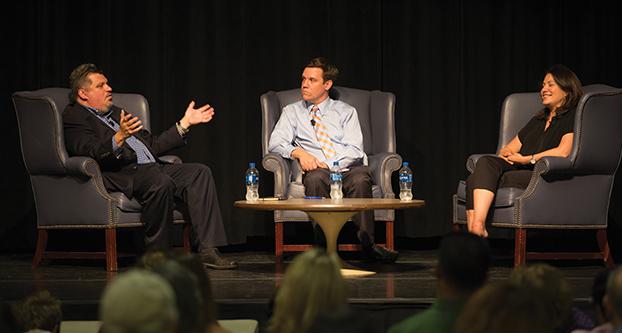What has become a taboo conversation in the break room and an uncomfortable topic at the Thanksgiving dinner table was faced head-on last week by two nationally-known speakers at Fresno State as they exhibited a new way to discuss politics in their discussion, “Trumping of American Politics: What Now?”
Ruben Navarrette, nationally syndicated columnist and former Fresno State lecturer, along with CNN political commentator and president of Solis Strategies, Patti Solis-Doyle, spoke to an audience of nearly 300 who gathered inside the Satellite Student Union last week to witness how “grown-ups should talk” about topics that often generate disagreements — like politics.
The 55-minute discussion last Thursday was moderated by Joe Moore, content director for Valley Public Radio and host of “Valley Edition.” He immediately addressed the day’s news cycle.
“It’s been a very interesting day, typically interesting for the president,” Moore said, referring to the reported deal made by congressional Democratic leaders, house minority leader Nancy Pelosi, senate minority leader Chuck Schumer, and President Donald Trump on the Deferred Action for Childhood Arrivals (DACA).
Moore said tweets made by Trump claimed no deal was reached in terms of DACA, and that extreme security at the border was not off the table.
He asked both panelists if the president’s tweets in response to the media reports are “the kinds of things that would keep chief of staff John Kelly up at night.” The comment caused the audience to laugh.
“It’s certainly never a boring day,” Solis-Doyle responded.
And while the political commentator recognized Kelly’s management abilities, she said “Donald Trump doesn’t want to be managed. He has no interest in being managed whatsoever.”
Further into the discussion, Moore questioned whether Trump’s tweets were a form of strategy or “lack of discipline.”
“I would say it’s strategy in the sense where he knows how to change the subject,” Navarrette said. “He knows how to manipulate the media. He’s the most media savvy president we’ve ever had.”
Navarrette suggested that Trump is aware of what goes on at major news networks. And he said the president knows ways to shift the national discussion.
“He’s always playing sort of three-dimensional chess,” Navarrette said.
Solis-Doyle disagreed.
“I agree that Donald Trump is the most media savvy president we’ve ever had,” Solis-Doyles said. “But I don’t think he has a strategy. I don’t think he has a political strategy. I think he does what he wants to do without consultation of anyone. Sometimes he’s successful and sometimes he’s not.”
The event, coordinated by the Institute of Leadership and Public Policy and sponsored by the College of Social Sciences, featured a Q&A session which allowed audience members like Fresno State senior Clarissa Stockton to voice her questions.
Stockton asked how the Democratic National Committee (DNC) plans to bring a generation of “disenfranchised” voters back after the “Bernie [Sanders] debacle.”
“I can’t tell you how disheartened I was when I had people who had been Democrats for years telling me that they were voting for Donald Trump because they were so hurt over the Hillary thing,” Stockton added.
The crowd applauded her question.
Solis-Doyle responded by saying elections are often extremely passionate.
“You put your heart and soul into it and your money and your time and you get very, very invested,” Solis-Doyle said. “I saw that happen in 2016 between the Bernie supporters and the Hillary [Clinton] supporters, and it’s a good thing because you’re supposed to be passionate, but once the fight is over, once the election is done, we have to come together.”
Stockton asked for ways to inspire young people to vote other than revamping the DNC.
To that, Navarrette said it isn’t the Democratic Party’s responsibility to engage voters.
Stockton responded, “No one promised you a perfect political system. If the system is broken and the party is [unable to make out], vote for somebody else.”
The panelists held personal meet and greets after the discussion. The discussion itself was a manifestation of what could become of two people disagreeing but still respecting each other.
Navarrette said he wanted to participate as a panelist to demonstrate respectful debate and discussion. He met Solis-Doyle in Washington, D.C., for an “off-the-record” talk, but it later blossomed into a long-lasting friendship, he said.
“What’s lacking in America is the ability to disagree with people and it not get ugly and personal,” Navarrette said. “That’s what we tried to do here. I think it was successful. We did push back on each other once in awhile, but I think this is how grown-ups should talk.”
The columnist encouraged students to facilitate their own discussions and work beyond the fear of backlash by developing “really thick skin.”
“What people think about [students] is not important. We in our community have done a good job of internalizing what people think about us,” Navarrette said. “We care a lot about what the neighborhoods say, what our [aunts] and [family friends] say — you have to get away from that.”
And Navarrette also stressed the idea of becoming and staying informed. Media influence was a recurring theme throughout the discussion.
Stockton said the discussion, while not divisive did, lacked advice for future action for how to engage youth in politics.
“It was a true discussion, which is what is was supposed to be, but nothing that was going to help,” Stockton said. “I’m leaving with the feeling that we’re just going to be stuck in the same cycle that we’re in.”




